
AI-Blueprints
📁 This repository hosts a growing collection of AI blueprint projects that run end-to-end using Jupyter notebooks, MLflow deployments, and Streamlit web apps.🛠️ All projects are built using HP AI Studio with ❤️ If you find this useful, please don’t forget to star the repository ⭐ and support our work 🚀
Stars: 181
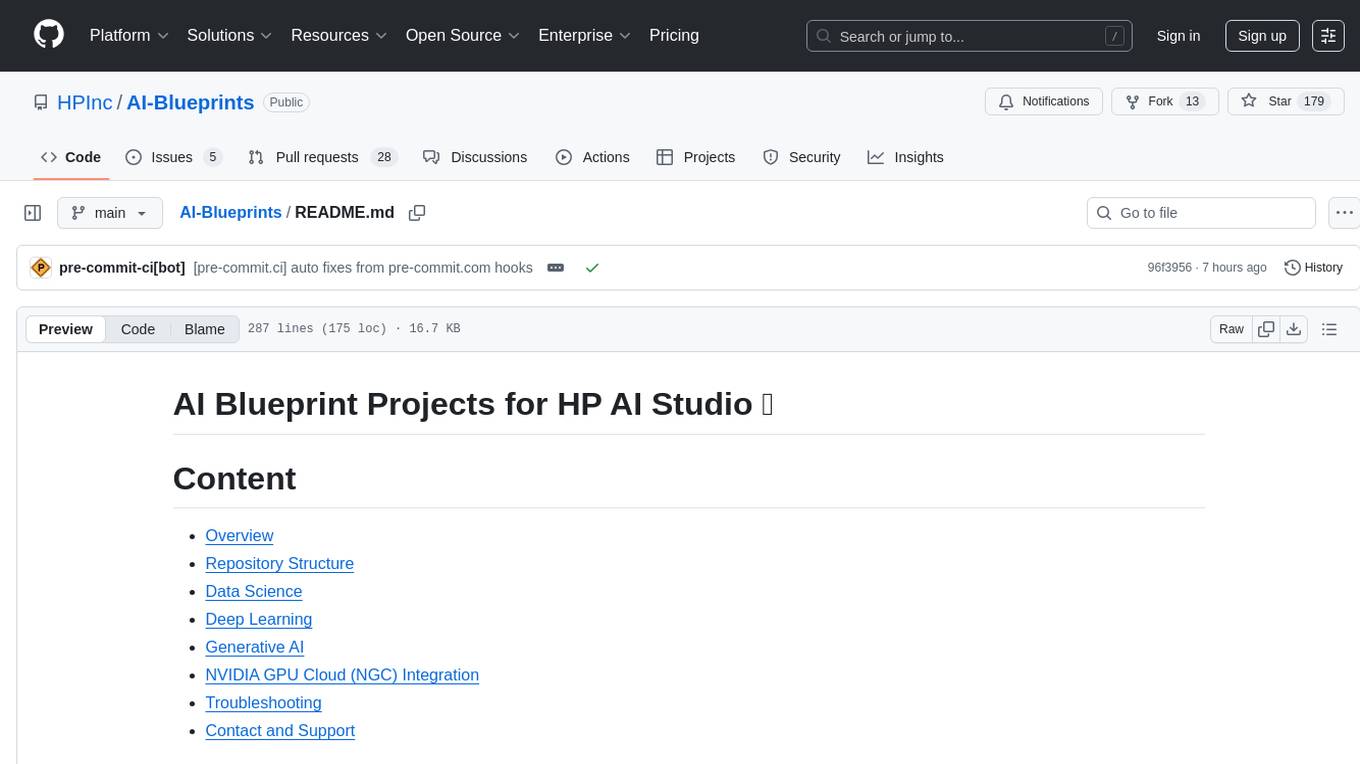
This repository hosts a collection of AI blueprint projects for HP AI Studio, providing end-to-end solutions across key AI domains like data science, machine learning, deep learning, and generative AI. The projects are designed to be plug-and-play, utilizing open-source and hosted models to offer ready-to-use solutions. The repository structure includes projects related to classical machine learning, deep learning applications, generative AI, NGC integration, and troubleshooting guidelines for common issues. Each project is accompanied by detailed descriptions and use cases, showcasing the versatility and applicability of AI technologies in various domains.
README:
Get started instantly with HP AI Studio — run over 20 fully local AI Blueprint projects with one click in less than 5 minutes:
- Overview
- Repository Structure
- Data Science
- Deep Learning
- Generative AI
- NVIDIA GPU Cloud (NGC) Integration
- Troubleshooting
- Contact and Support
This repository hosts a growing collection of AI blueprint projects that run end-to-end using Jupyter notebooks, MLflow deployments, and Streamlit web apps. Each blueprint is designed to be plug-and-play, giving you ready-to-use solutions across key AI domains like data science, machine learning, deep learning, and generative AI. All projects are built to work seamlessly with HP AI Studio.
These blueprints make use of local, open-source models including:
- LLaMA (Meta)
- Qwen (Alibaba)
- BERT (Google)
- LLaMA Nemotron (NVIDIA)
In addition, some examples use hosted models from Hugging Face for added flexibility.
- Data visualization
- Data analysis
- Image classification
- Super resolution
- LLM fine-tuning
- Multi-modal RAG
- Audio translation
- Agentic RAG
- And much more
We’re actively expanding this collection. If you have ideas or want to suggest a blueprint for HP AI Studio, feel free to open an issue. We’d love to hear from you.
To run any of these projects quickly and effortlessly, you can download HP AI Studio for free.
# Root Directory
├── data-science/ # Projects related to classical machine learning and statistical analysis
│ ├── classification-with-svm/ # SVM-based classification implementation
│ └── data-analysis-with-var/ # Vector AutoRegression analysis workflow
│
├── deep-learning/ # Deep learning applications using popular frameworks
│ ├── classification-with-keras/ # Image classification using Keras
│ ├── question-answering-with-bert/ # QA system built on top of BERT model
│ ├── recommendation-system-with-tensorflow/ # TensorFlow-based recommendation engine
│ ├── spam-detection-with-nlp/ # NLP-driven spam classifier
│ ├── super-resolution-with-fsrcnn/ # Image enhancement using FSRCNN
│ └── text-generation-with-rnn/ # RNN-based generative model for text
│
├── generative-ai/ # Generative AI applications across text, code, and image
│ ├── automated-evaluation-with-structured-outputs/ # Eval pipeline for structured generation
│ ├── code-generation-with-langchain/ # Code synthesis using LangChain
│ ├── fine-tuning-with-orpo/ # ORPO-based fine-tuning procedure
│ ├── image-generation-with-stablediffusion/ # StableDiffusion-powered image generation
│ ├── text-generation-with-langchain/ # Text generation leveraging LangChain stack
│ ├── text-summarization-with-langchain/ # Summarization pipeline using LangChain
│ └── vanilla-rag-with-langchain/ # Basic Retrieval-Augmented Generation with LangChain
│
├── ngc-integration/ # Projects leveraging NVIDIA GPU Cloud and libraries
│ ├── agentic-rag-with-tensorrtllm/ # RAG system using TensorRT-LLM and agentic planning
│ ├── audio-translation-with-nemo/ # Speech translation with NVIDIA NeMo
│ ├── data-analysis-with-cudf/ # RAPIDS cuDF-based data manipulation
│ ├── data-visualization-with-cudf/ # Visualizations using GPU-accelerated tools
│ └── vacation-recommendation-with-bert/ # Recommendation app using BERT embeddings
The blueprint projects in this folder demonstrate how to build data science applications with HP AI Studio.
We provide 2 blueprint projects, each designed for quick and easy use to help you get started efficiently.
This project is a simple classification experiment focused on predicting species of iris flowers.
It runs on the Data Science Workspace, demonstrating basic supervised learning techniques for multi-class classification tasks.
This project explores a regression experiment using mobility data collected during the COVID-19 pandemic.
It highlights how city-level movement patterns changed during the crisis. The experiment runs on the Data Science Workspace.
The blueprint projects in this folder demonstrate how to build deep learning applications with HP AI Studio.
We provide 6 blueprint projects, each designed for quick and easy use to help you get started efficiently.
This project performs basic image classification using the TensorFlow framework.
It trains a model to classify handwritten digits from the MNIST dataset and runs on the Deep Learning Workspace.
This project demonstrates a simple BERT Question Answering (QA) experiment. It provides code to train a BERT-based model, as well as instructions to load a pretrained model from Hugging Face.
The model is deployed using MLflow to expose an inference service capable of answering questions based on input text.
This project builds a simple recommender system for movies using TensorFlow.
It trains on user-item interaction data to predict movie preferences and runs on the Deep Learning Workspace.
This project implements a text classification system to detect spam messages.
It uses deep learning techniques and requires the Deep Learning Workspace for training and inference.
This project showcases a Computer Vision experiment that applies convolutional neural networks for image super-resolution — enhancing the quality and resolution of input images.
This project illustrates how to build a simple character-by-character text generation model.
It trains on a dataset containing Shakespeare's texts, demonstrating the fundamentals of text generation by predicting one character at a time.
The blueprint projects in this folder demonstrate how to build generative AI applications with HP AI Studio.
We provide 7 blueprint projects, each designed for quick and easy use to help you get started efficiently.
Automated Evaluation with Structured Outputs turns a local Meta-Llama-3 model into an MLflow-served scorer that rates any batch of texts (e.g., project abstracts) against arbitrary rubric criteria.
- Generates scores locally via
llama.cpp(no data leaves your machine) - Registers the evaluator as a pyfunc model in MLflow
- Exposes a REST
/invocationsendpoint - Ships two front-ends — a Streamlit dashboard and a pure HTML/JS UI — for instant human-friendly interaction and CSV download.
This notebook performs automatic code explanation by extracting code snippets from Jupyter notebooks and generating natural language descriptions using LLMs. It supports contextual enrichment based on adjacent markdown cells, enables configurable prompt templating, and integrates with PromptQuality and Galileo for evaluation and tracking. The pipeline is modular, supports local or hosted model inference, and is compatible with LLaMA, Mistral, and Hugging Face-based models. It also includes GitHub notebook crawling, metadata structuring, and vector store integration for downstream tasks like RAG and semantic search.
This project demonstrates a full-stack LLM fine-tuning experiment using ORPO (Open-Source Reinforcement Pretraining Objective) to align a base language model with human preference data. It leverages the Z by HP AI Studio Local GenAI environment, and uses models such as LLaMA 3, Gemma 1B, and Mistral 7B as foundations.
We incorporate:
Galileo PromptQuality for evaluating model responses with human-like scorers (e.g., context adherence) TensorBoard for human feedback visualization before fine-tuning A flexible model selector and inference runner architecture A comparative setup to benchmark base vs fine-tuned models on the same prompts
This notebook performs image generation inference using the Stable Diffusion architecture, with support for both standard and DreamBooth fine-tuned models. It loads configuration and secrets from YAML files, enables local or deployed inference execution, and calculates custom image quality metrics, such as entropy and complexity. The pipeline is modular, supports Hugging Face model loading, and integrates with PromptQuality for evaluation and tracking.
This notebook implements a full Retrieval-Augmented Generation (RAG) pipeline for automatically generating a scientific presentation script. It integrates paper retrieval from arXiv, text extraction and chunking, embedding generation with HuggingFace, vector storage with ChromaDB, and context-aware generation using LLMs. It also integrates Galileo Prompt Quality for evaluation and logging, and supports multi-source model loading, including local Llama.cpp, HuggingFace-hosted, and HuggingFace-cloud models like Mistral or DeepSeek.
This project demonstrates how to build a semantic chunking and summarization pipeline for texts using LangChain, Sentence Transformers, and Galileo for model evaluation, protection, and observability. It leverages the Z by HP AI Studio Local GenAI image and the Meta Llama 3.1 model with 8B parameters to generate concise and contextually accurate summaries from text data.
This project is an AI-powered vanilla RAG (Retrieval-Augmented Generation) chatbot built using LangChain and Galileo for model evaluation, protection, and observability. It leverages the Z by HP AI Studio Local GenAI image and the Meta Llama 3.1 model with 8B parameters to generate contextual and document-grounded answers to user queries about Z by HP AI Studio.
The blueprint projects in this folder demonstrate how to integrate NVIDIA NGC (NVIDIA GPU Cloud) resources with HP AI Studio.
We provide 5 blueprint projects, each designed for quick and easy use to help you get started efficiently.
This project contains a single integrated pipeline—Agentic RAG for AI Studio with TRT-LLM and LangGraph—that implements a Retrieval-Augmented Generation (RAG) workflow using:
TensorRT-backed Llama-3.1-Nano (TRT-LLM): for fast, GPU-accelerated inference. LangGraph: to orchestrate an agentic, multi-step decision flow (relevance check, memory lookup, query rewriting, retrieval, answer generation, and memory update). ChromaDB: as a local vector store over Markdown context files (about AI Studio). SimpleKVMemory: a lightweight on-disk key-value store to cache query-answer pairs.
This project demonstrates an end-to-end audio translation pipeline using NVIDIA NeMo models. It takes an English audio sample and performs:
- Speech-to-Text (STT) conversion using Citrinet
- Text Translation (TT) from English to Spanish using NMT
- Text-to-Speech (TTS) synthesis in Spanish using FastPitch and HiFiGAN
All steps are GPU-accelerated, and the full workflow is integrated with MLflow for experiment tracking and model registration.
In this project, we provide notebooks to compare the execution time of dataset operations using traditional Pandas (CPU) versus NVIDIA’s cuDF, a GPU-accelerated drop-in replacement for Pandas. This example is presented in two different formats:
-
Original Example Notebook: This version, created by NVIDIA, runs the entire evaluation within a single notebook. It includes downloading the data and restarting the kernel to activate the cuDF extension.
-
Data Analysis Notebooks: These notebooks use preprocessed datasets of varying sizes from the datafabric folder in AI Studio. The evaluation is split across two notebooks—one using Pandas (CPU) and the other using cuDF (GPU)—with performance metrics logged to MLflow.
This project is a GPU-accelerated, interactive exploratory data analysis (EDA) dashboard for the OpenCellID dataset. It uses Panel and cuDF to deliver lightning-fast geospatial analysis and visualization.
You can explore cell tower distributions by radio type, operator, country, and time window — rendered live on an interactive map with full GPU acceleration.
This project implements an AI-powered recommendation agent that delivers personalized travel suggestions based on user queries.
It leverages the NVIDIA NeMo Framework and BERT embeddings to understand user intent and generate highly relevant, tailored vacation recommendations.
This section provides solutions for common issues users may encounter when working with AI Blueprint projects in HP AI Studio:
-
Check Hardware Compatibility Each project’s README includes recommended minimum hardware specifications (e.g., RAM, VRAM). Make sure your system meets these requirements—especially when working with large models or during deployment, as insufficient resources can cause failures.
-
Models or Datasets Not Visible After Download If you download models or datasets while your workspace is running, they might not appear in the workspace. In such cases, restart your workspace to ensure they are properly recognized.
-
Connection or SSL Errors in Notebooks If you encounter SSL certificate or connection errors while accessing websites from notebooks (especially on restricted networks), verify your network settings. Consider using a proxy to bypass restrictive network constraints.
-
File or Path Not Found Errors Ensure that all required files and directories are correctly placed as specified in the project’s README. If any paths or files are missing, create or move them to the correct locations.
-
GPU Not Available For projects requiring NVIDIA GPUs, verify GPU availability by running
nvidia-smiin the terminal. Ensure that a compatible GPU is accessible and has sufficient free memory to run the project. -
Deployment Errors Despite Meeting Requirements Even if your hardware meets the specs, limited available RAM or VRAM can cause deployment issues. Close other running workspaces or programs to free up memory.
-
CUDA OOM on Ubuntu despite free VRAM (VRAM fragmentation on display GPU) Linux desktop apps/compositor fragment VRAM, so a large contiguous cudaMalloc fails while Windows succeeds. To fix it, close unnecessarily running Jupyter kernels, GPU-accelerated apps or use a non-display GPU; for llama.cpp set low_vram=False, n_ubatch=16–32, n_batch=32–64 (keep n_gpu_layers=-1 for faster inference).
-
API Timeout Issues API requests triggered for the local MLflow deployment in the AI Studio have a response timeout limit (approximately 4 minutes). For long-running tasks or large inputs, use the provided notebooks instead of the API to avoid timeout errors.
-
Large Datasets If your dataset is too large to fit into RAM, avoid using libraries like pandas, which rely on eager loading. Instead, use libraries that support lazy loading (processing data in chunks on demand), such as Polars or DuckDB. These tools are designed to handle large-scale data more efficiently without exhausting system memory.
-
Troubleshooting: Refer to the Troubleshooting section of the main README in our public AI-Blueprints GitHub repo for solutions to common issues.
-
Issues & Bugs: Open a new issue in our AI-Blueprints GitHub repo.
-
Docs: AI Studio Documentation.
-
Community: Join the HP AI Creator Community for questions and help.
Built with ❤️ using HP AI Studio.
For Tasks:
Click tags to check more tools for each tasksFor Jobs:
Alternative AI tools for AI-Blueprints
Similar Open Source Tools

AI-Blueprints
This repository hosts a collection of AI blueprint projects for HP AI Studio, providing end-to-end solutions across key AI domains like data science, machine learning, deep learning, and generative AI. The projects are designed to be plug-and-play, utilizing open-source and hosted models to offer ready-to-use solutions. The repository structure includes projects related to classical machine learning, deep learning applications, generative AI, NGC integration, and troubleshooting guidelines for common issues. Each project is accompanied by detailed descriptions and use cases, showcasing the versatility and applicability of AI technologies in various domains.
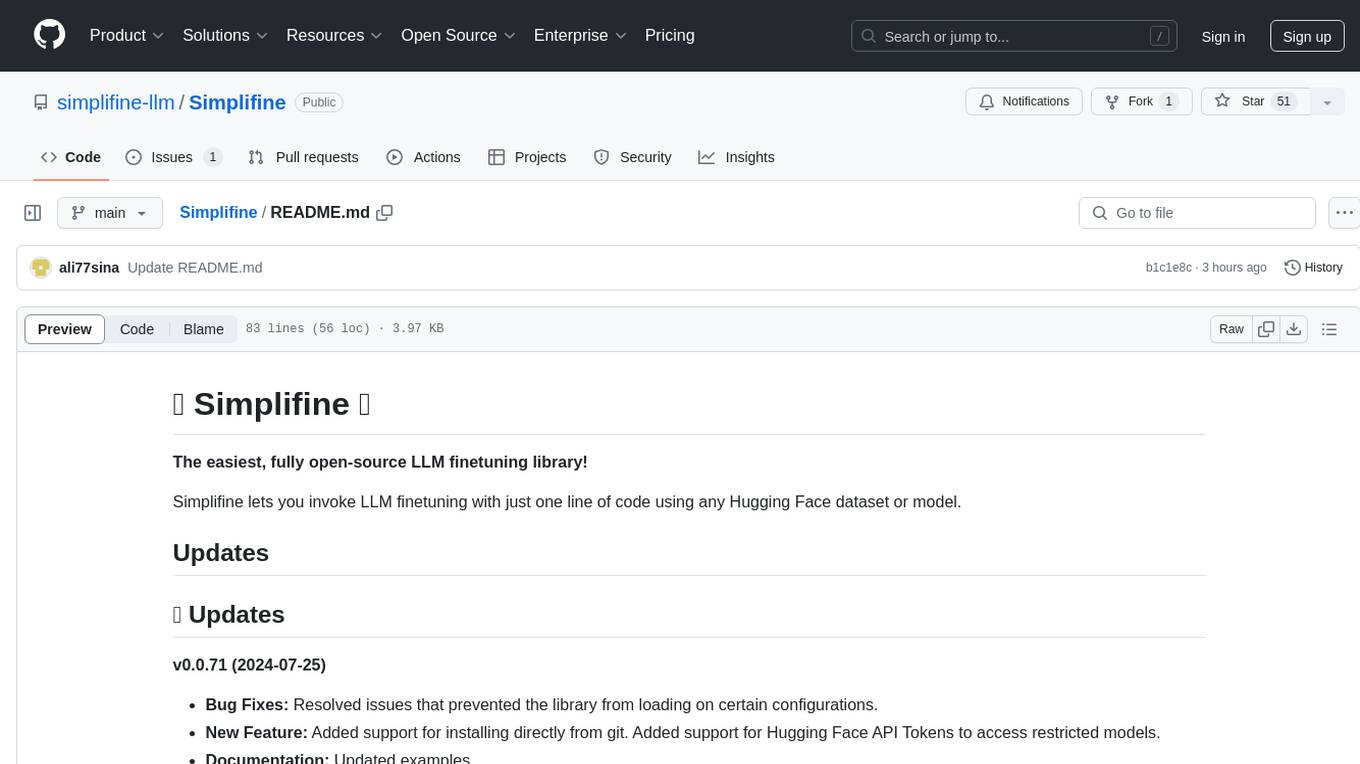
Simplifine
Simplifine is an open-source library designed for easy LLM finetuning, enabling users to perform tasks such as supervised fine tuning, question-answer finetuning, contrastive loss for embedding tasks, multi-label classification finetuning, and more. It provides features like WandB logging, in-built evaluation tools, automated finetuning parameters, and state-of-the-art optimization techniques. The library offers bug fixes, new features, and documentation updates in its latest version. Users can install Simplifine via pip or directly from GitHub. The project welcomes contributors and provides comprehensive documentation and support for users.
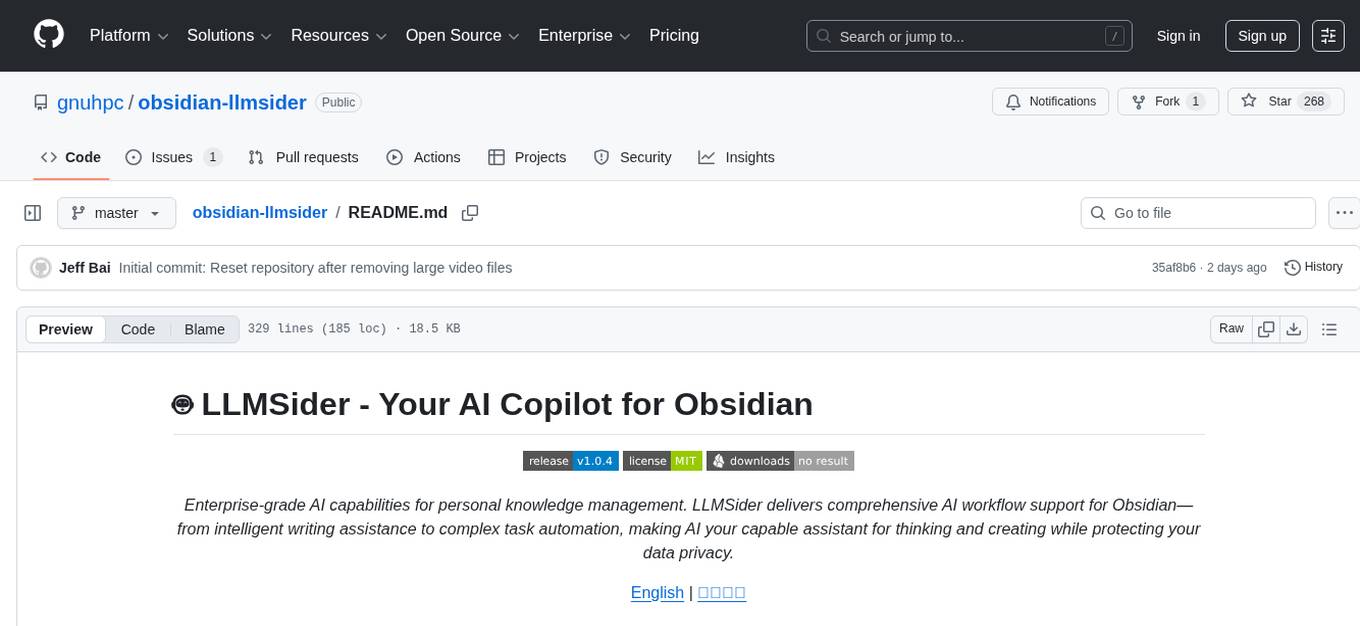
obsidian-llmsider
LLMSider is an AI assistant plugin for Obsidian that offers flexible multi-model support, deep workflow integration, privacy-first design, and a professional tool ecosystem. It provides comprehensive AI capabilities for personal knowledge management, from intelligent writing assistance to complex task automation, making AI a capable assistant for thinking and creating while ensuring data privacy.
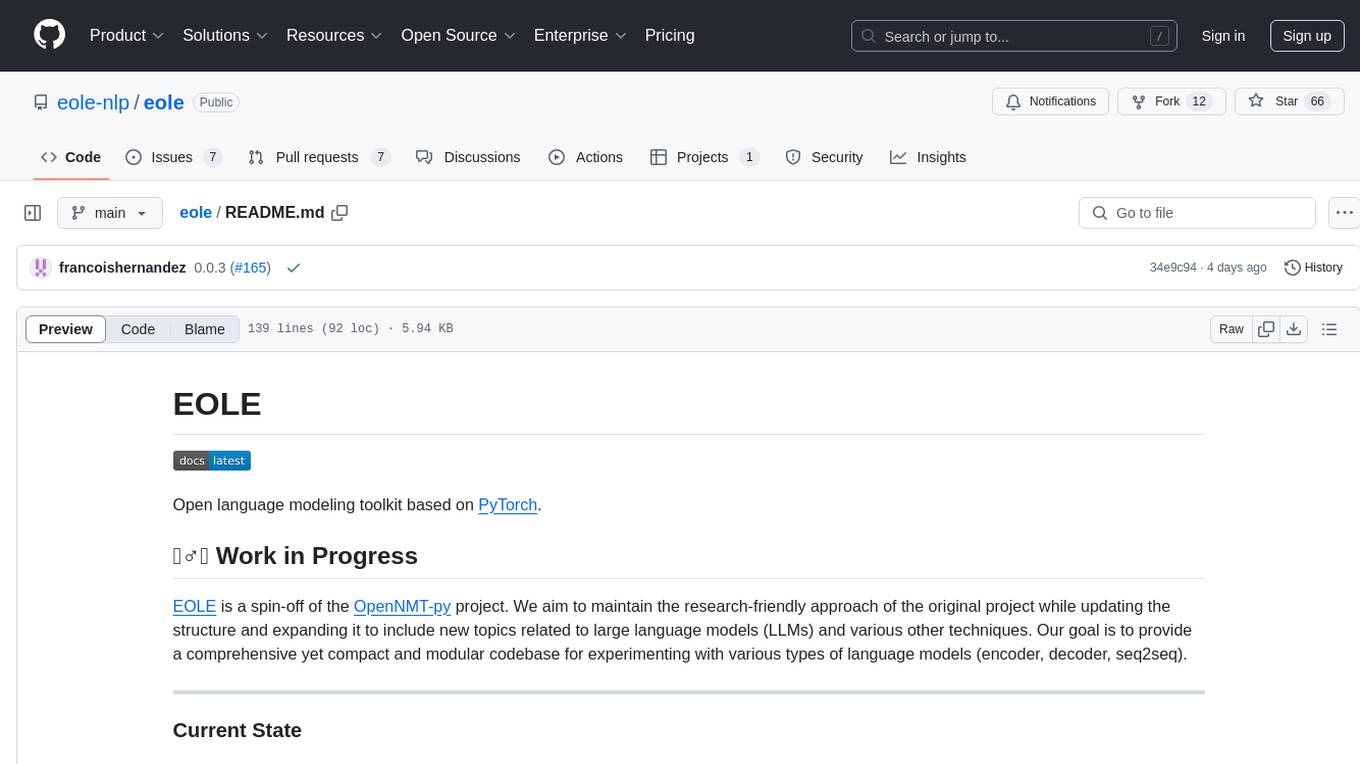
eole
EOLE is an open language modeling toolkit based on PyTorch. It aims to provide a research-friendly approach with a comprehensive yet compact and modular codebase for experimenting with various types of language models. The toolkit includes features such as versatile training and inference, dynamic data transforms, comprehensive large language model support, advanced quantization, efficient finetuning, flexible inference, and tensor parallelism. EOLE is a work in progress with ongoing enhancements in configuration management, command line entry points, reproducible recipes, core API simplification, and plans for further simplification, refactoring, inference server development, additional recipes, documentation enhancement, test coverage improvement, logging enhancements, and broader model support.

griptape
Griptape is a modular Python framework for building AI-powered applications that securely connect to your enterprise data and APIs. It offers developers the ability to maintain control and flexibility at every step. Griptape's core components include Structures (Agents, Pipelines, and Workflows), Tasks, Tools, Memory (Conversation Memory, Task Memory, and Meta Memory), Drivers (Prompt and Embedding Drivers, Vector Store Drivers, Image Generation Drivers, Image Query Drivers, SQL Drivers, Web Scraper Drivers, and Conversation Memory Drivers), Engines (Query Engines, Extraction Engines, Summary Engines, Image Generation Engines, and Image Query Engines), and additional components (Rulesets, Loaders, Artifacts, Chunkers, and Tokenizers). Griptape enables developers to create AI-powered applications with ease and efficiency.
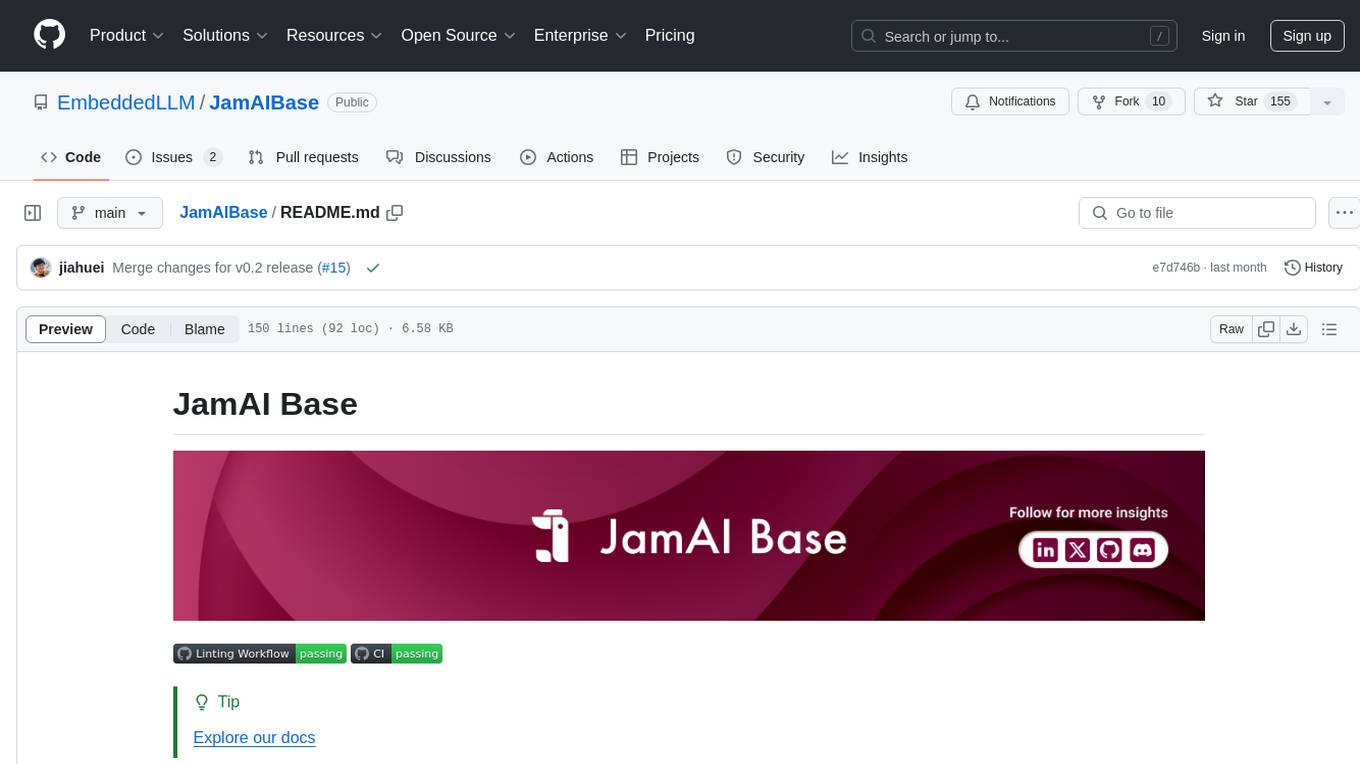
JamAIBase
JamAI Base is an open-source platform integrating SQLite and LanceDB databases with managed memory and RAG capabilities. It offers built-in LLM, vector embeddings, and reranker orchestration accessible through a spreadsheet-like UI and REST API. Users can transform static tables into dynamic entities, facilitate real-time interactions, manage structured data, and simplify chatbot development. The tool focuses on ease of use, scalability, flexibility, declarative paradigm, and innovative RAG techniques, making complex data operations accessible to users with varying technical expertise.
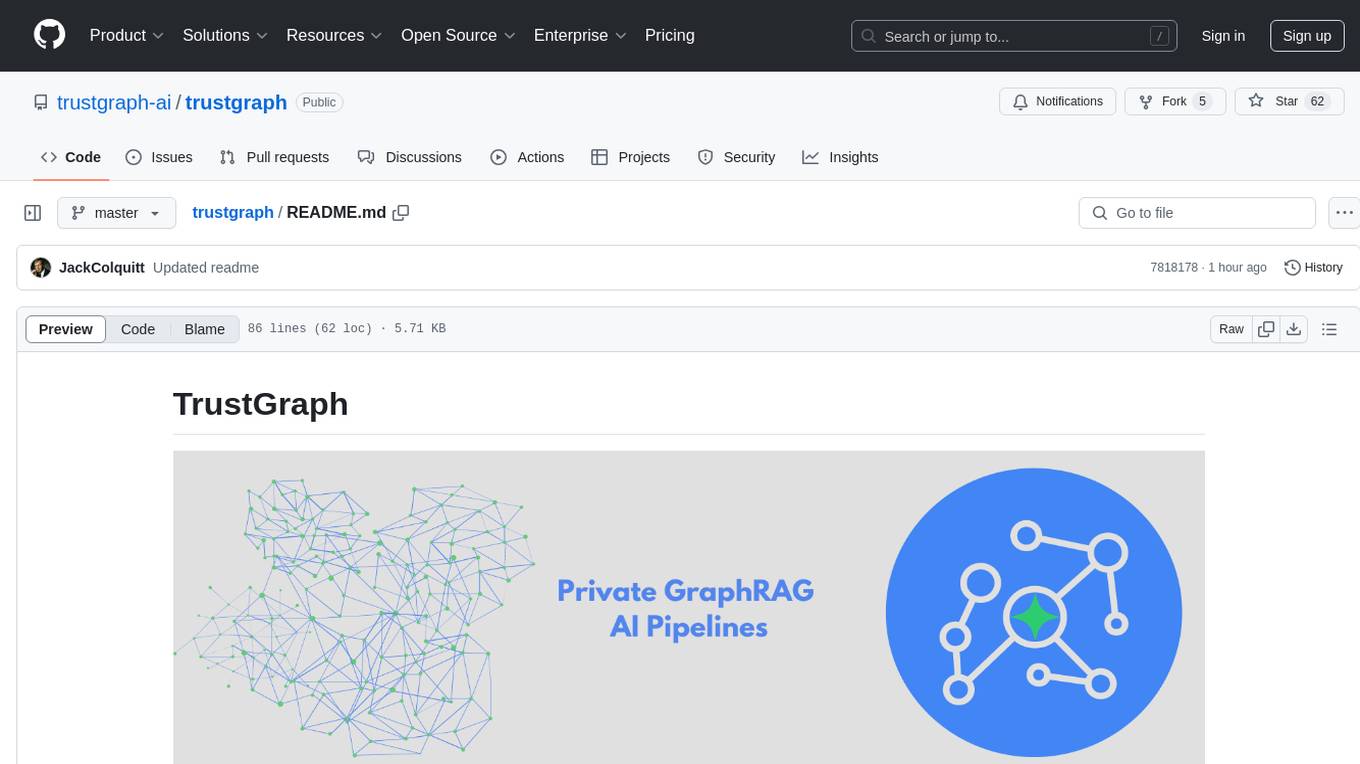
trustgraph
TrustGraph is a tool that deploys private GraphRAG pipelines to build a RDF style knowledge graph from data, enabling accurate and secure `RAG` requests compatible with cloud LLMs and open-source SLMs. It showcases the reliability and efficiencies of GraphRAG algorithms, capturing contextual language flags missed in conventional RAG approaches. The tool offers features like PDF decoding, text chunking, inference of various LMs, RDF-aligned Knowledge Graph extraction, and more. TrustGraph is designed to be modular, supporting multiple Language Models and environments, with a plug'n'play architecture for easy customization.
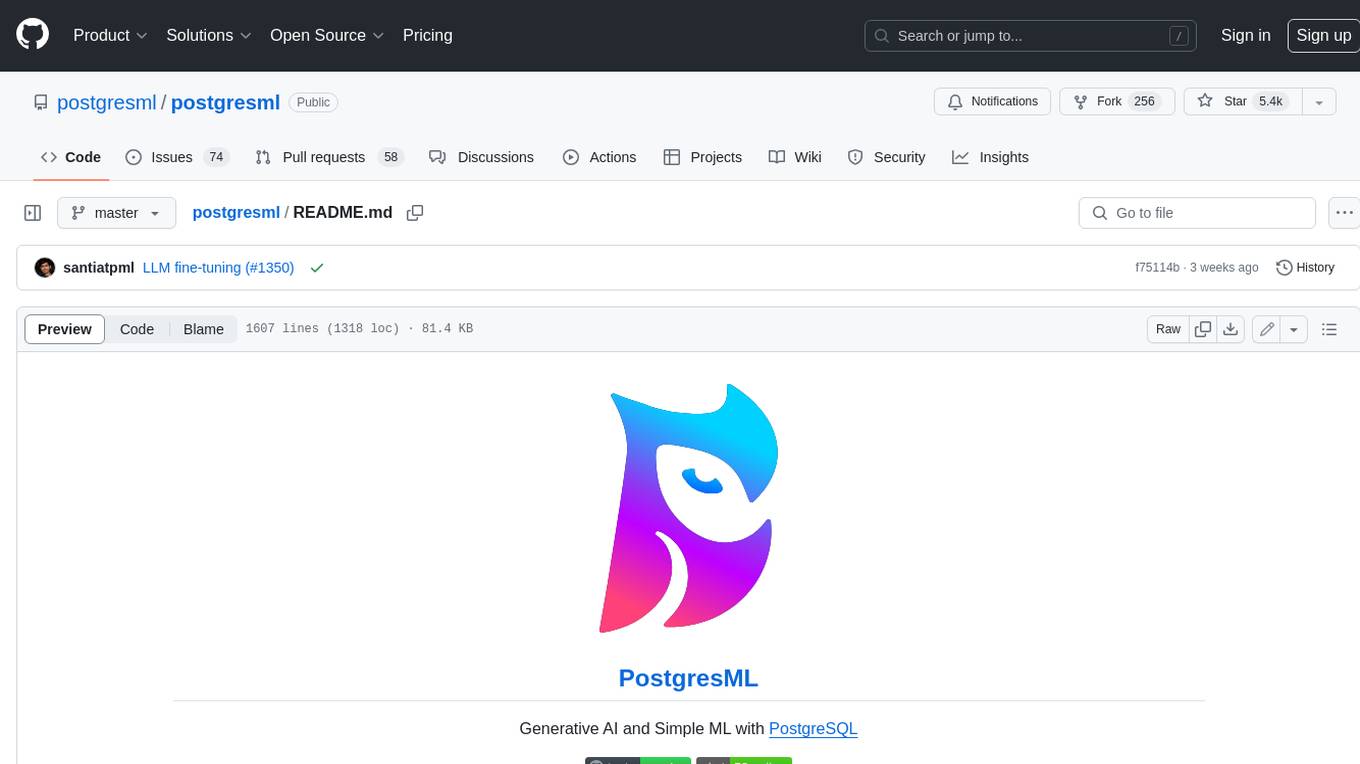
postgresml
PostgresML is a powerful Postgres extension that seamlessly combines data storage and machine learning inference within your database. It enables running machine learning and AI operations directly within PostgreSQL, leveraging GPU acceleration for faster computations, integrating state-of-the-art large language models, providing built-in functions for text processing, enabling efficient similarity search, offering diverse ML algorithms, ensuring high performance, scalability, and security, supporting a wide range of NLP tasks, and seamlessly integrating with existing PostgreSQL tools and client libraries.

kollektiv
Kollektiv is a Retrieval-Augmented Generation (RAG) system designed to enable users to chat with their favorite documentation easily. It aims to provide LLMs with access to the most up-to-date knowledge, reducing inaccuracies and improving productivity. The system utilizes intelligent web crawling, advanced document processing, vector search, multi-query expansion, smart re-ranking, AI-powered responses, and dynamic system prompts. The technical stack includes Python/FastAPI for backend, Supabase, ChromaDB, and Redis for storage, OpenAI and Anthropic Claude 3.5 Sonnet for AI/ML, and Chainlit for UI. Kollektiv is licensed under a modified version of the Apache License 2.0, allowing free use for non-commercial purposes.
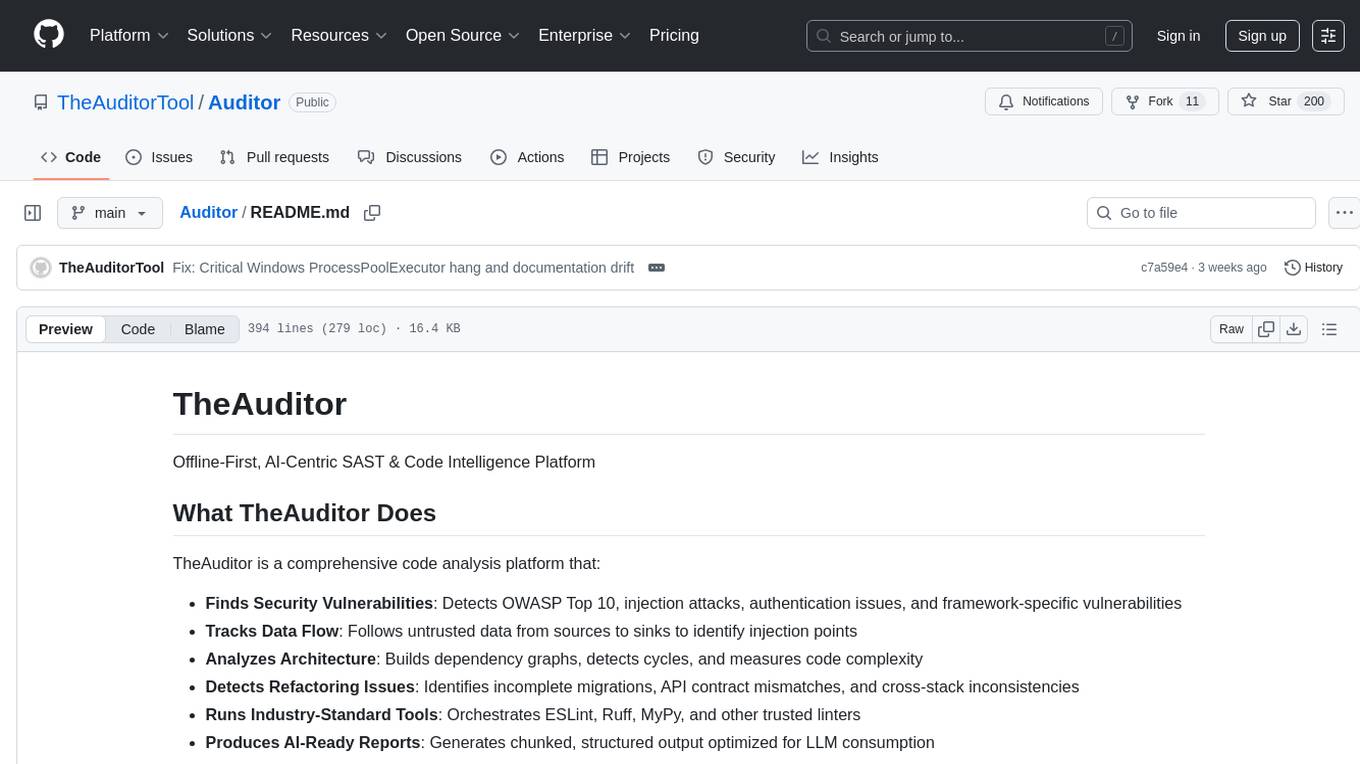
Auditor
TheAuditor is an offline-first, AI-centric SAST & code intelligence platform designed to find security vulnerabilities, track data flow, analyze architecture, detect refactoring issues, run industry-standard tools, and produce AI-ready reports. It is specifically tailored for AI-assisted development workflows, providing verifiable ground truth for developers and AI assistants. The tool orchestrates verifiable data, focuses on AI consumption, and is extensible to support Python and Node.js ecosystems. The comprehensive analysis pipeline includes stages for foundation, concurrent analysis, and final aggregation, offering features like refactoring detection, dependency graph visualization, and optional insights analysis. The tool interacts with antivirus software to identify vulnerabilities, triggers performance impacts, and provides transparent information on common issues and troubleshooting. TheAuditor aims to address the lack of ground truth in AI development workflows and make AI development trustworthy by providing accurate security analysis and code verification.
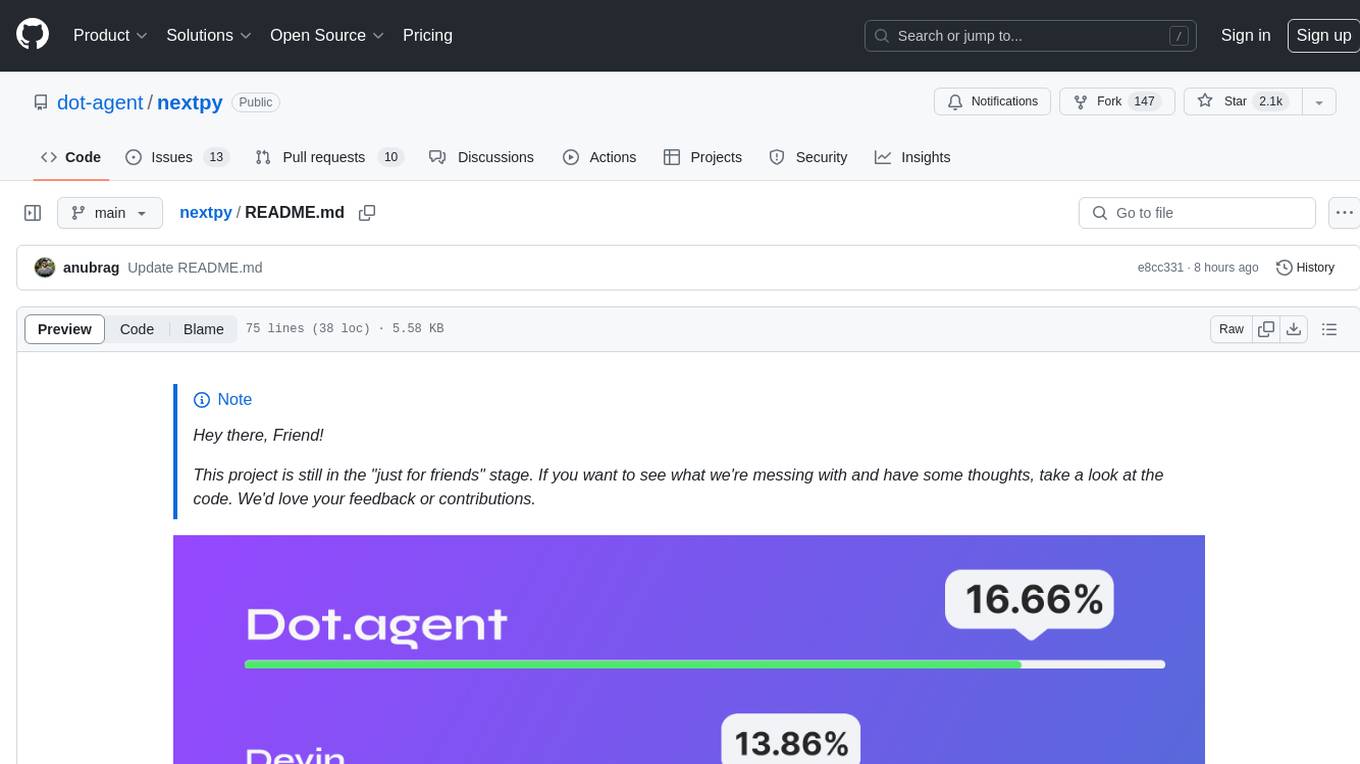
nextpy
Nextpy is a cutting-edge software development framework optimized for AI-based code generation. It provides guardrails for defining AI system boundaries, structured outputs for prompt engineering, a powerful prompt engine for efficient processing, better AI generations with precise output control, modularity for multiplatform and extensible usage, developer-first approach for transferable knowledge, and containerized & scalable deployment options. It offers 4-10x faster performance compared to Streamlit apps, with a focus on cooperation within the open-source community and integration of key components from various projects.
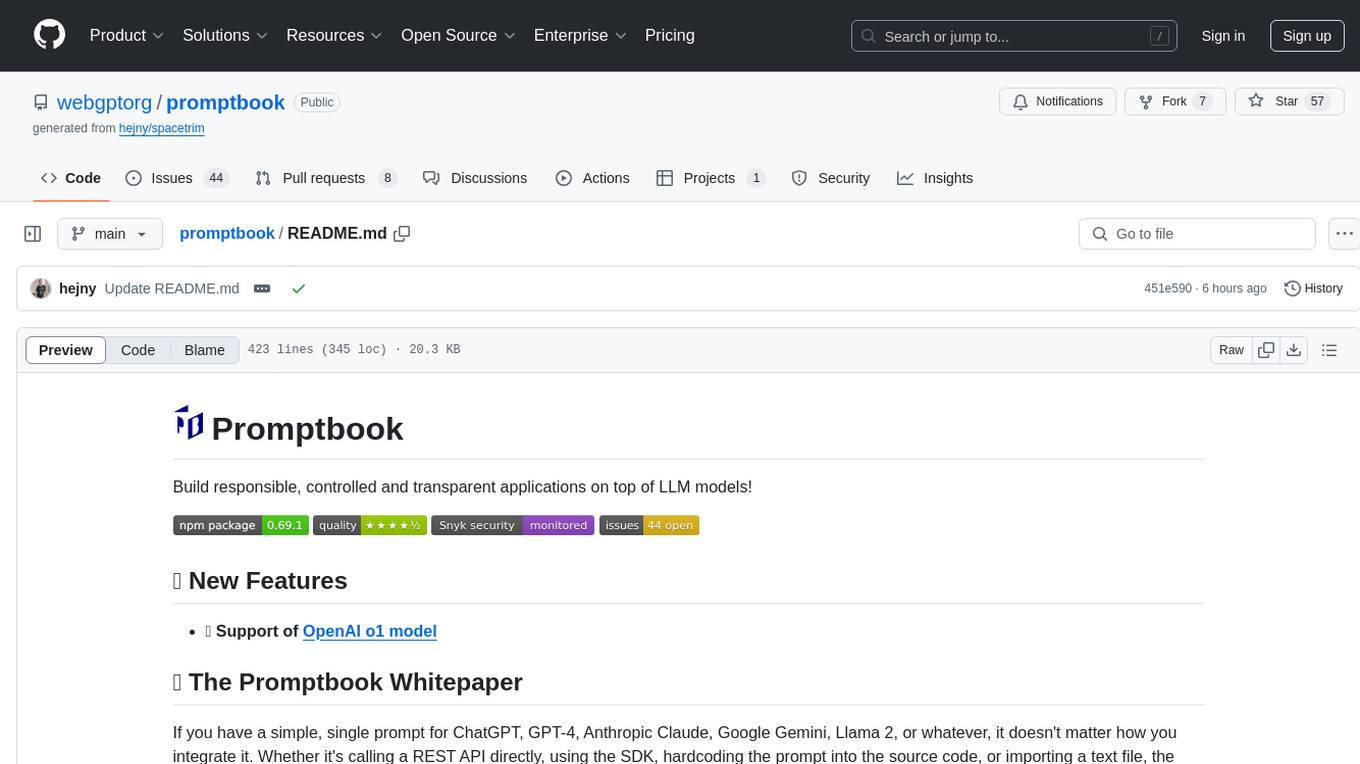
promptbook
Promptbook is a library designed to build responsible, controlled, and transparent applications on top of large language models (LLMs). It helps users overcome limitations of LLMs like hallucinations, off-topic responses, and poor quality output by offering features such as fine-tuning models, prompt-engineering, and orchestrating multiple prompts in a pipeline. The library separates concerns, establishes a common format for prompt business logic, and handles low-level details like model selection and context size. It also provides tools for pipeline execution, caching, fine-tuning, anomaly detection, and versioning. Promptbook supports advanced techniques like Retrieval-Augmented Generation (RAG) and knowledge utilization to enhance output quality.
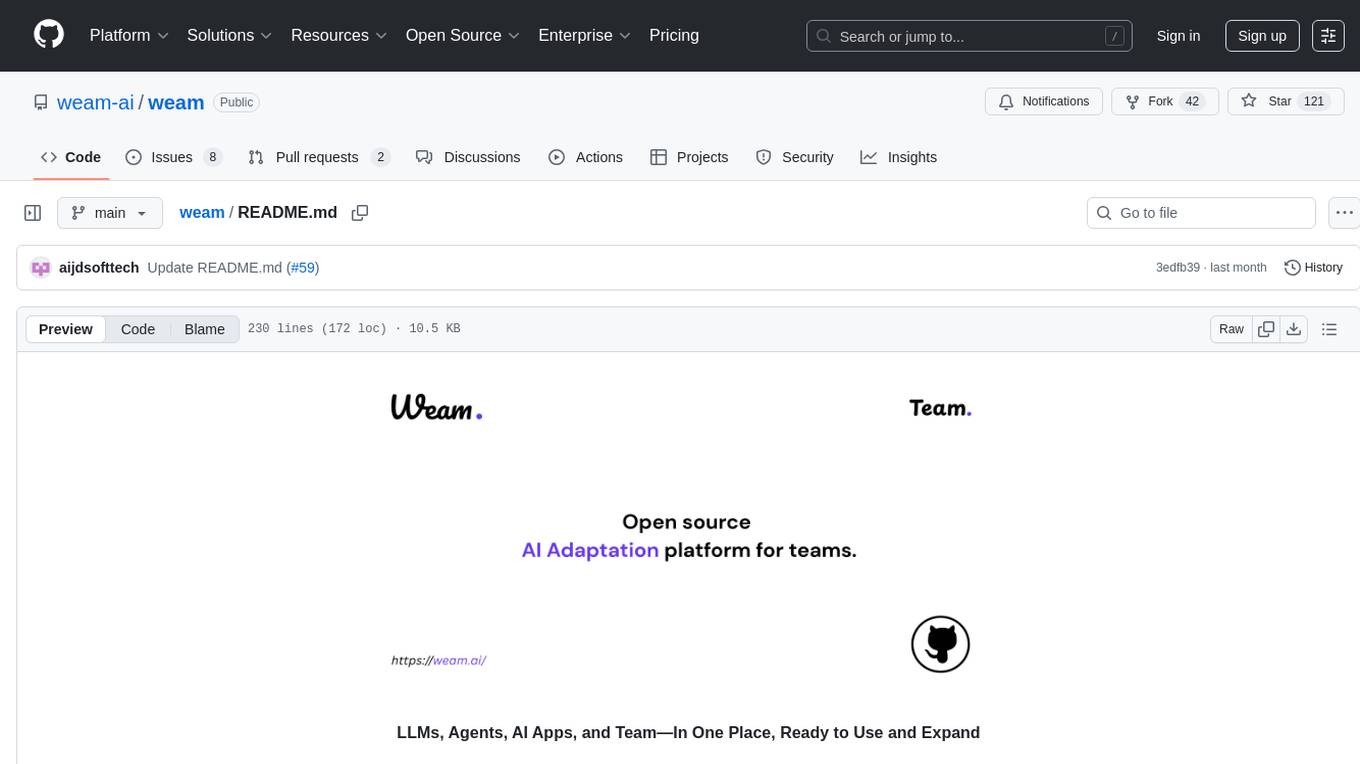
weam
Weam is an open source platform designed to help teams systematically adopt AI. It provides a production-ready stack with Next.js frontend and Node.js/Python backend, allowing for immediate deployment and use. Weam connects to major LLM providers, enabling easy access to the latest AI models. The platform organizes AI interactions into 'Brains' for different departments, offering customization and expansion options. Features include chat system, productivity tools, sharing & access controls, prompt library, AI agents, RAG, MCP, enterprise features, pre-built automations, and upcoming AI app solutions. Weam is free, open source, and scalable to meet growing needs.
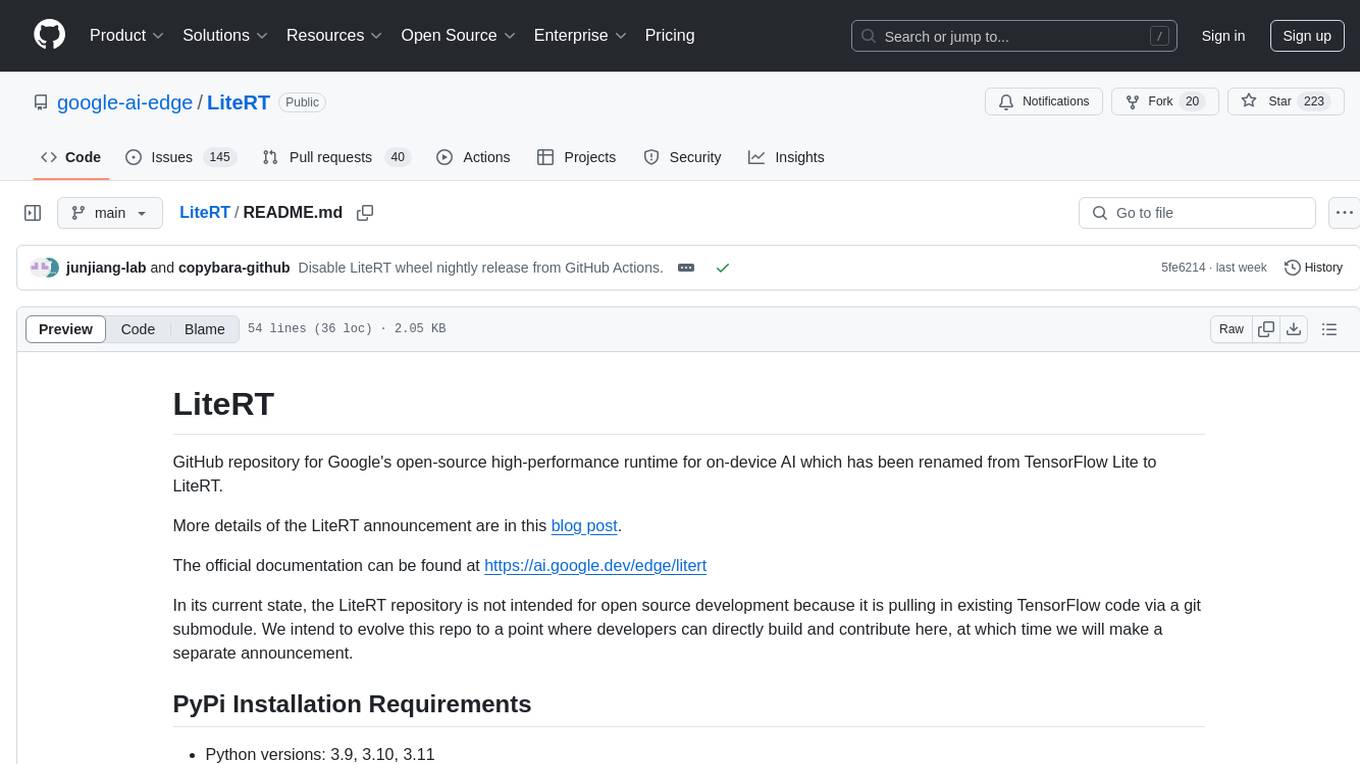
LiteRT
LiteRT is Google's open-source high-performance runtime for on-device AI, previously known as TensorFlow Lite. The repository is currently not intended for open-source development, but aims to evolve to allow direct building and contributions. LiteRT supports Python versions 3.9, 3.10, 3.11 on Linux and MacOS. It ensures compatibility with existing .tflite file extension and format, offering conversion tools and continued active development under the name LiteRT.
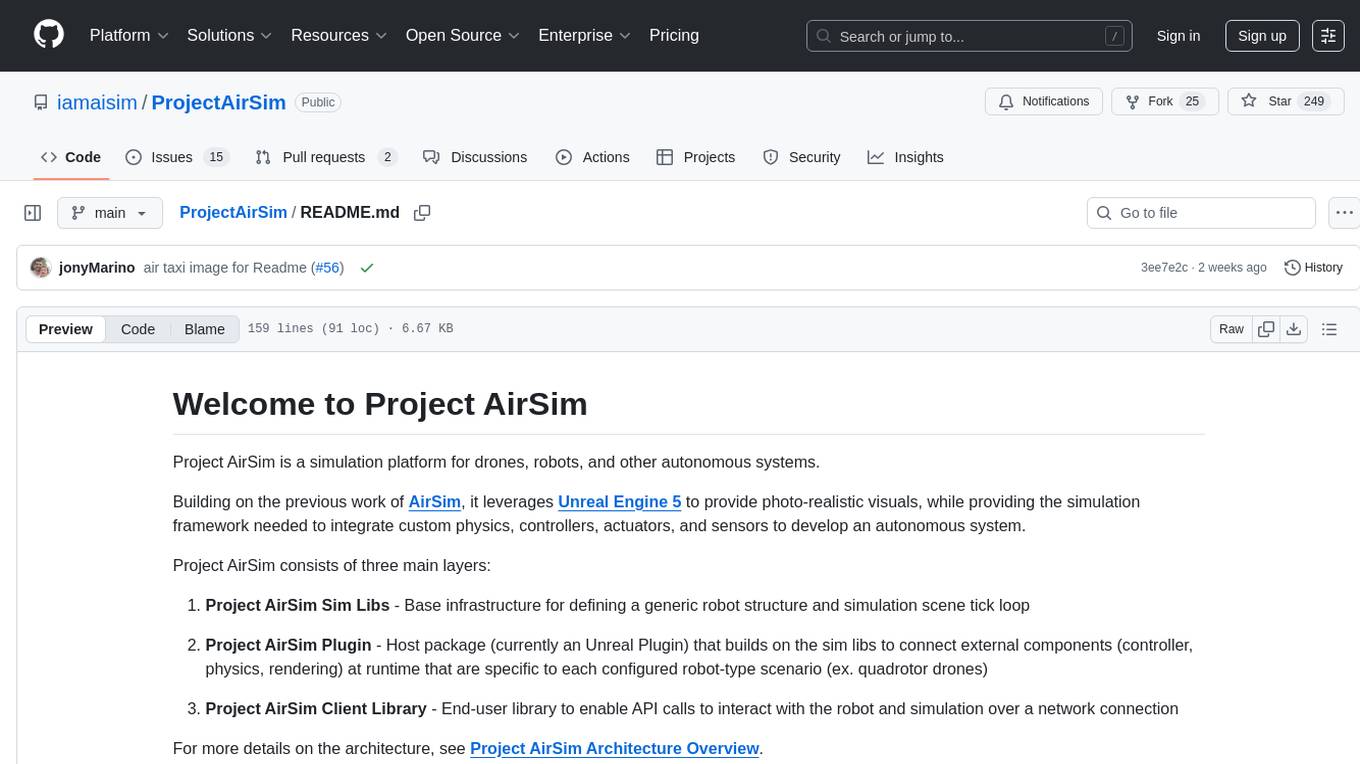
ProjectAirSim
Project AirSim is a simulation platform for drones, robots, and autonomous systems. Leveraging Unreal Engine 5, it provides photo-realistic visuals and a simulation framework for custom physics, controllers, actuators, and sensors. It consists of three main layers: Sim Libs, Plugin, and Client Library. It supports Windows 11 and Ubuntu 22, inviting collaboration and enterprise support. Users can join the community, contribute to the roadmap, and get started with pre-built binaries or building from source. It offers headless running options and references for configuration settings, API, controllers, sensors, scene, physics, and FAQ.
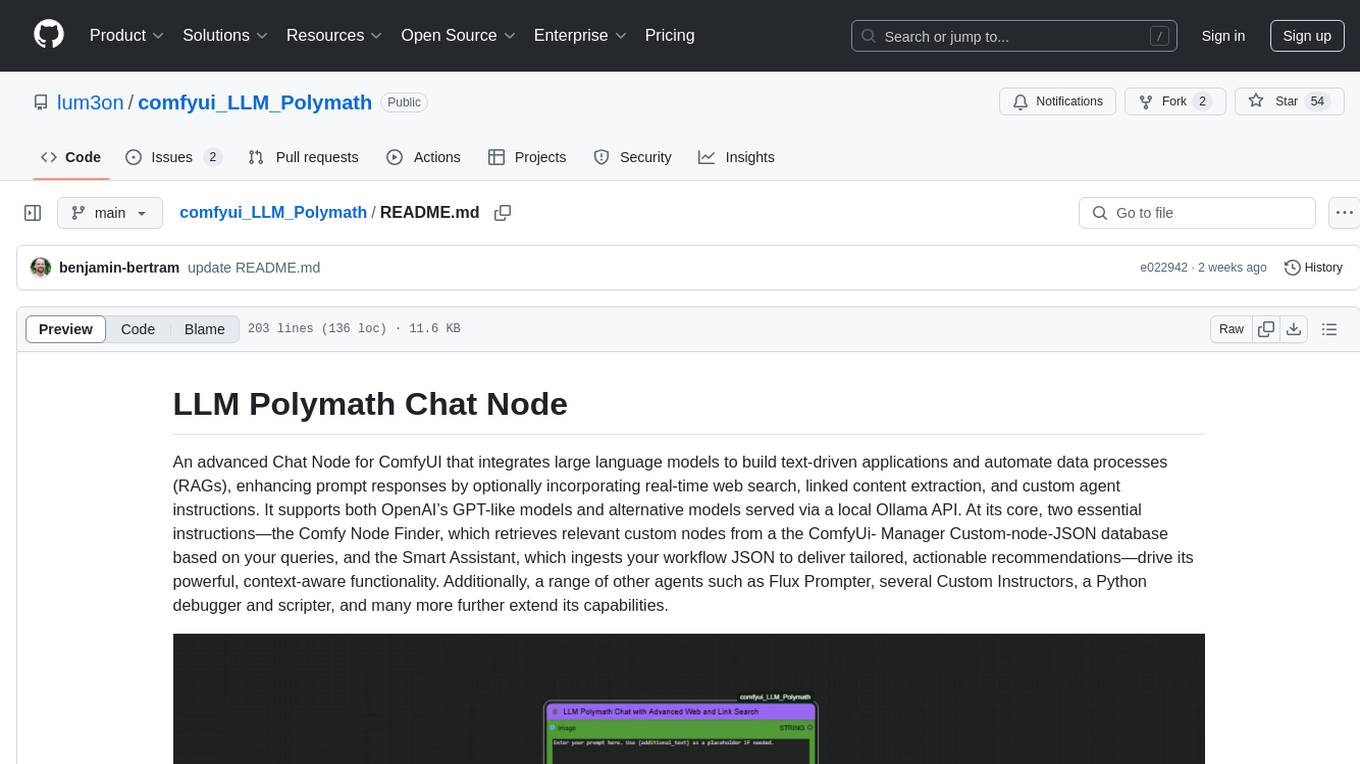
comfyui_LLM_Polymath
LLM Polymath Chat Node is an advanced Chat Node for ComfyUI that integrates large language models to build text-driven applications and automate data processes, enhancing prompt responses by incorporating real-time web search, linked content extraction, and custom agent instructions. It supports both OpenAI’s GPT-like models and alternative models served via a local Ollama API. The core functionalities include Comfy Node Finder and Smart Assistant, along with additional agents like Flux Prompter, Custom Instructors, Python debugger, and scripter. The tool offers features for prompt processing, web search integration, model & API integration, custom instructions, image handling, logging & debugging, output compression, and more.
For similar tasks

Azure-Analytics-and-AI-Engagement
The Azure-Analytics-and-AI-Engagement repository provides packaged Industry Scenario DREAM Demos with ARM templates (Containing a demo web application, Power BI reports, Synapse resources, AML Notebooks etc.) that can be deployed in a customer’s subscription using the CAPE tool within a matter of few hours. Partners can also deploy DREAM Demos in their own subscriptions using DPoC.

sorrentum
Sorrentum is an open-source project that aims to combine open-source development, startups, and brilliant students to build machine learning, AI, and Web3 / DeFi protocols geared towards finance and economics. The project provides opportunities for internships, research assistantships, and development grants, as well as the chance to work on cutting-edge problems, learn about startups, write academic papers, and get internships and full-time positions at companies working on Sorrentum applications.

tidb
TiDB is an open-source distributed SQL database that supports Hybrid Transactional and Analytical Processing (HTAP) workloads. It is MySQL compatible and features horizontal scalability, strong consistency, and high availability.

zep-python
Zep is an open-source platform for building and deploying large language model (LLM) applications. It provides a suite of tools and services that make it easy to integrate LLMs into your applications, including chat history memory, embedding, vector search, and data enrichment. Zep is designed to be scalable, reliable, and easy to use, making it a great choice for developers who want to build LLM-powered applications quickly and easily.

telemetry-airflow
This repository codifies the Airflow cluster that is deployed at workflow.telemetry.mozilla.org (behind SSO) and commonly referred to as "WTMO" or simply "Airflow". Some links relevant to users and developers of WTMO: * The `dags` directory in this repository contains some custom DAG definitions * Many of the DAGs registered with WTMO don't live in this repository, but are instead generated from ETL task definitions in bigquery-etl * The Data SRE team maintains a WTMO Developer Guide (behind SSO)

mojo
Mojo is a new programming language that bridges the gap between research and production by combining Python syntax and ecosystem with systems programming and metaprogramming features. Mojo is still young, but it is designed to become a superset of Python over time.

pandas-ai
PandasAI is a Python library that makes it easy to ask questions to your data in natural language. It helps you to explore, clean, and analyze your data using generative AI.

databend
Databend is an open-source cloud data warehouse that serves as a cost-effective alternative to Snowflake. With its focus on fast query execution and data ingestion, it's designed for complex analysis of the world's largest datasets.
For similar jobs

promptflow
**Prompt flow** is a suite of development tools designed to streamline the end-to-end development cycle of LLM-based AI applications, from ideation, prototyping, testing, evaluation to production deployment and monitoring. It makes prompt engineering much easier and enables you to build LLM apps with production quality.

deepeval
DeepEval is a simple-to-use, open-source LLM evaluation framework specialized for unit testing LLM outputs. It incorporates various metrics such as G-Eval, hallucination, answer relevancy, RAGAS, etc., and runs locally on your machine for evaluation. It provides a wide range of ready-to-use evaluation metrics, allows for creating custom metrics, integrates with any CI/CD environment, and enables benchmarking LLMs on popular benchmarks. DeepEval is designed for evaluating RAG and fine-tuning applications, helping users optimize hyperparameters, prevent prompt drifting, and transition from OpenAI to hosting their own Llama2 with confidence.

MegaDetector
MegaDetector is an AI model that identifies animals, people, and vehicles in camera trap images (which also makes it useful for eliminating blank images). This model is trained on several million images from a variety of ecosystems. MegaDetector is just one of many tools that aims to make conservation biologists more efficient with AI. If you want to learn about other ways to use AI to accelerate camera trap workflows, check out our of the field, affectionately titled "Everything I know about machine learning and camera traps".

leapfrogai
LeapfrogAI is a self-hosted AI platform designed to be deployed in air-gapped resource-constrained environments. It brings sophisticated AI solutions to these environments by hosting all the necessary components of an AI stack, including vector databases, model backends, API, and UI. LeapfrogAI's API closely matches that of OpenAI, allowing tools built for OpenAI/ChatGPT to function seamlessly with a LeapfrogAI backend. It provides several backends for various use cases, including llama-cpp-python, whisper, text-embeddings, and vllm. LeapfrogAI leverages Chainguard's apko to harden base python images, ensuring the latest supported Python versions are used by the other components of the stack. The LeapfrogAI SDK provides a standard set of protobuffs and python utilities for implementing backends and gRPC. LeapfrogAI offers UI options for common use-cases like chat, summarization, and transcription. It can be deployed and run locally via UDS and Kubernetes, built out using Zarf packages. LeapfrogAI is supported by a community of users and contributors, including Defense Unicorns, Beast Code, Chainguard, Exovera, Hypergiant, Pulze, SOSi, United States Navy, United States Air Force, and United States Space Force.

llava-docker
This Docker image for LLaVA (Large Language and Vision Assistant) provides a convenient way to run LLaVA locally or on RunPod. LLaVA is a powerful AI tool that combines natural language processing and computer vision capabilities. With this Docker image, you can easily access LLaVA's functionalities for various tasks, including image captioning, visual question answering, text summarization, and more. The image comes pre-installed with LLaVA v1.2.0, Torch 2.1.2, xformers 0.0.23.post1, and other necessary dependencies. You can customize the model used by setting the MODEL environment variable. The image also includes a Jupyter Lab environment for interactive development and exploration. Overall, this Docker image offers a comprehensive and user-friendly platform for leveraging LLaVA's capabilities.

carrot
The 'carrot' repository on GitHub provides a list of free and user-friendly ChatGPT mirror sites for easy access. The repository includes sponsored sites offering various GPT models and services. Users can find and share sites, report errors, and access stable and recommended sites for ChatGPT usage. The repository also includes a detailed list of ChatGPT sites, their features, and accessibility options, making it a valuable resource for ChatGPT users seeking free and unlimited GPT services.

TrustLLM
TrustLLM is a comprehensive study of trustworthiness in LLMs, including principles for different dimensions of trustworthiness, established benchmark, evaluation, and analysis of trustworthiness for mainstream LLMs, and discussion of open challenges and future directions. Specifically, we first propose a set of principles for trustworthy LLMs that span eight different dimensions. Based on these principles, we further establish a benchmark across six dimensions including truthfulness, safety, fairness, robustness, privacy, and machine ethics. We then present a study evaluating 16 mainstream LLMs in TrustLLM, consisting of over 30 datasets. The document explains how to use the trustllm python package to help you assess the performance of your LLM in trustworthiness more quickly. For more details about TrustLLM, please refer to project website.

AI-YinMei
AI-YinMei is an AI virtual anchor Vtuber development tool (N card version). It supports fastgpt knowledge base chat dialogue, a complete set of solutions for LLM large language models: [fastgpt] + [one-api] + [Xinference], supports docking bilibili live broadcast barrage reply and entering live broadcast welcome speech, supports Microsoft edge-tts speech synthesis, supports Bert-VITS2 speech synthesis, supports GPT-SoVITS speech synthesis, supports expression control Vtuber Studio, supports painting stable-diffusion-webui output OBS live broadcast room, supports painting picture pornography public-NSFW-y-distinguish, supports search and image search service duckduckgo (requires magic Internet access), supports image search service Baidu image search (no magic Internet access), supports AI reply chat box [html plug-in], supports AI singing Auto-Convert-Music, supports playlist [html plug-in], supports dancing function, supports expression video playback, supports head touching action, supports gift smashing action, supports singing automatic start dancing function, chat and singing automatic cycle swing action, supports multi scene switching, background music switching, day and night automatic switching scene, supports open singing and painting, let AI automatically judge the content.